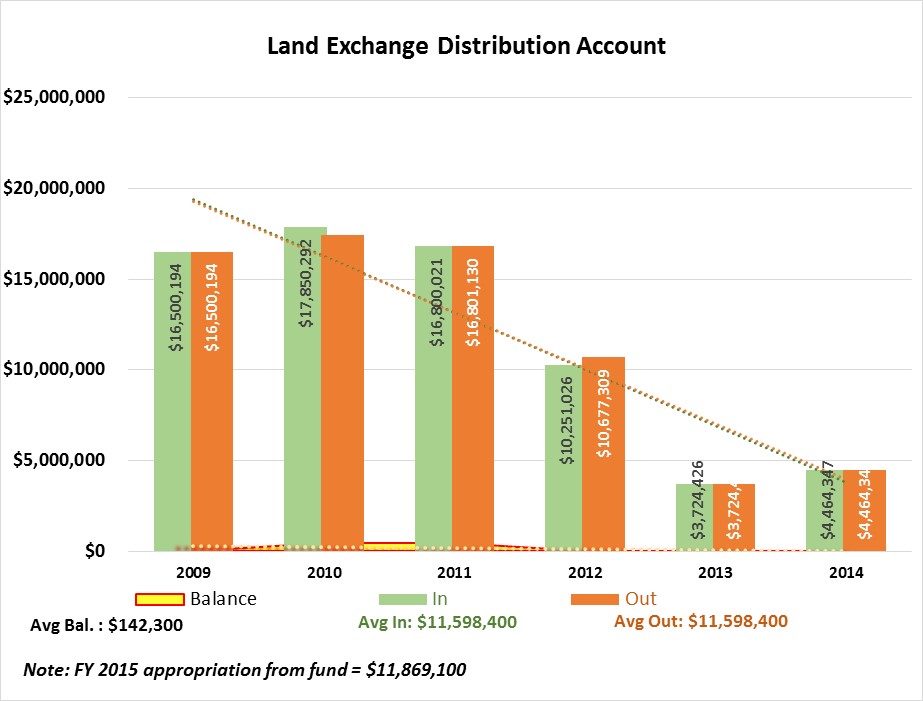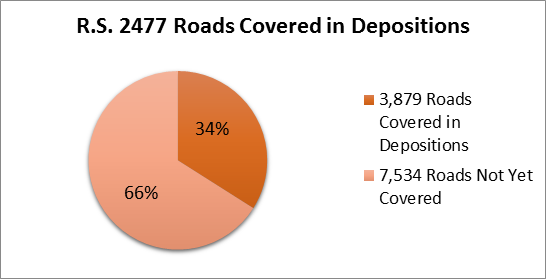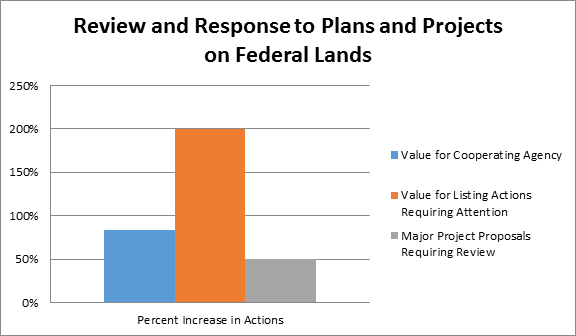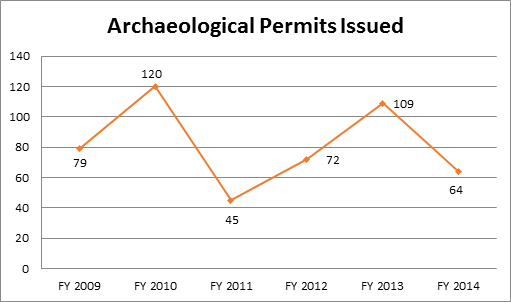The Public Lands Policy Coordinating Office (PLPCO) participates in decision making discussions at the federal, state, and local level that affect public land interests in Utah. The office supports efforts to validate public access to federal lands in the state. PLPCO studies issues related to the transfer of federal public lands to the state. It administers the Public Roads (RS2477) validation. It promotes the responsible use of archaeological resources in Utah.
During the 2015 General Session, the Legislature appropriated for Fiscal Year 2016, $11,218,300 from all sources for Public Lands Office. This is a 147.9 percent increase from Fiscal Year 2015 revised estimated amounts from all sources. The total includes $6,717,900 from the General/Education Funds, an increase of 686.9 percent from revised Fiscal Year 2015 estimates.
In addition to statewide compensation and internal service fund cost increases, the following appropriation adjustments were made during the 2015 General Session:
The figure below shows the activities of the Land Exchange Distribution Account (which provides the funding for the Constitutional Defense Restricted Accunt) over time, the appropriated amount for the current fiscal year, as well as the average revenues, expenditures, and balances.
Rights-of-Way (for roads) Validation Program -- Litigation Overview
Rights-of-Way (for roads) Validation Program -- Litigation: The total number of roads currently in litigation across 22 counties is approximately 12,000. As litigation is a fluid process, PLPCO estimates that litigating these roads to a final resolution could take years. PLPCO is currently focused on resolving the rights-of-way claims through negotiation or legislation. The court cases are currently in the discovery phase, which consists of gathering and memorializing the evidence that supports the State of Utah's road claims. This evidence consists of witness depositions, documents identification and production, and GPS mapping and filming.
Rights-of-Way (for roads) Validation Program -- Litigation -- Depositions
Rights-of-Way (for roads) Validation Program -- Litigation -- Depositions: Witnesses with knowledge of specific rights-of-way must be interviewed, prepped, and deposed in order to acquire evidence to validate rights-of-way granted under federal law (RS 2477). To validate a road it must be proven that the road was regularly maintained by the county, or that the road was continuously used by the public for a period of at least 10 years. Such maintenance or public use must have occurred prior to 1976. Each right-of-way in litigation will have a minimum of two witnesses that must be deposed. Each deposition is conducted on the record with the presence of the attorneys for both the plaintiffs (the State and individual county) and the defendant (United States). Each deposition can take anywhere from a few hours to several days, depending largely upon the health of the deponent and the number of roads the deponent knows. In late FY 2012, the parties agreed to a Case Management Order (CMO) that was approved by a judge that governs the deposition process. Since the CMO, depositions have focused on witnesses that are elderly or in poor health in order to preserve their testimony. To date approximately 160 depositions have been taken covering 3,879 roads, which constitutes approximately 34% of all the rights-of-way in RS 2477 litigation.

- Target: 100 depositions - additional 3,000 roads covered
Rights-of-Way (for roads) Validation Program – Documents
Rights-of-Way (for roads) Validation Program - Documents: Much of the evidence needed to validate the roads that have been in use for decades consists of historical documents, dating to before 1976. Such documents include road construction and maintenance records, county commission meetings minutes, photographs, maps, communications with federal land agencies, witness journals and diaries, Bureau of Land Management land use records, federal land agency policies, directives, resource management plans and transportation plans, archeological records, and recreation and tourism publications. Once identified and produced, these documents (sometimes numbering in the thousands of pages for a single county) are reviewed, evaluated for relevance and materiality, and catalogued. To date, PLPCO has processed approximately 30,400 pages of documents.
- Target: 30,000 pages
Rights-of-Way (for roads) Validation Program -- Litigation -- Video/GPS Roads
Rights-of-Way (for roads) Validation Program -- Litigation -- Video/GPS Roads: Most of the roughly 12,000 roads included in the litigation have been mapped by GPS (global positioning system) over the past several years. Funds were recently appropriated to acquire a 360 degree video camera that simultaneously captures GPS coordinates to produce higher quality evidence to assist in depicting the nature, condition, and scope of each road. The target is dependent on available staff time and the weather (roads cannot be driven and video cannot be taken when there is snow or excess water on the ground). To date, PLPCO has filmed all roads claimed in RS 2477 litigation in Washington, Rich, Daggett, and Emery counties, which constitutes 1,063 roads and approximately 3,500 miles.
- Target: Video 2,500 roads
Review of and Response to Federal Plans and Projects on Federal Lands
Review of and Response to Federal Plans and Projects on Federal Lands: The state has an interest in participating in the creation and review of the plans for resource utilization by federal land management agencies such as the Bureau of Land Management, Forest Service, and National Park Service. The state also has an interest in assisting with the environmental and economic review of resource development projects proposed for federal lands in Utah. Each year, hundreds of projects are proposed, and federal land planning is continuous. PLPCO participates as a Cooperating Agency, and coordinates the review of these projects and plans by state agencies in order to ensure that the state speaks with one voice. This measure does not have specific targets each fiscal year. PLPCO responds to all inquiries. The number of project reviews requiring Cooperating Agency status is increasing steeply, as is the increase in proposed listings under the ESA which require review. PLPCO also encourages and participates in negotiations among parties for resource protection and development agreements such as the recent agreement concerning conservation of the Graham's penstemon.

Archaeological Permitting
Archaeological Permitting: PLPCO is authorized to grant permits for qualified archaeologists to operate on state lands, and to grant a permit for excavation of lands for archaeological purposes. Permits are both principal investigator permits and data recovery permits. This measure shows the number of requests for permits that have been resolved in a timely manner (30 days by statute). This measure does not have specific targets each fiscal year. PLPCO has consistently responded to all requests for permits within 30 days.

Utah Code Section 63J-4-601 created the Public Lands Policy Coordinating Office (PLPCO) in 2005. PLPCO objectives and initiatives include:
RS2477 Validation
- initiate and support efforts to validate public access to federal lands through state and county-owned rights-of-way;
- initiate and prosecute, or join litigation that seeks to recognize rights-of-way; and
- initiate or support collaborative activities that result in recognition of public access to federal lands.
Federal Land Management and Decision Making
- initiate or participate in decision making discussions and dialogue that affect Utah's public lands interests such as legal matters involving the Endangered Species Act, recreation, and development; and
- represent Utah as a cooperating agency in the preparation and review of federal National Environmental Policy Act (NEPA) documents with the Bureau of Land Management, Forest Service, National Park Service, and other management agencies.
H.B. 148, Transfer of Public Lands Act and Related Study, 2012 General Session and H.B. 142, 2013 General Session
- respond to the mandates of H.B. 148 and H.B. 142; and
- oversee research and analyze comparative data relating to expenditures/results for similar management functions.
Archaeological Assistance and Permitting
- assist state agencies in developing the processes to provide for responsible use and stewardship of archaeological resources; and
- oversee the issuance and management of archaeological survey and excavation permits.
In addition, PLPCO provides staff for meetings of the Constitutional Defense Council (CDC). CDC is charged with providing advice and recommendations concerning the development of public lands policies to PLPCO, the Deputy Chief of Staff, and the Governor.
UCA Title 63C-4-103 allows the Legislature to appropriate monies from the Constitutional Defense Restricted Account to the Office and to the Council.
The Constitutional Defense Restricted Account, which is the main funding source for the Public Lands Policy Coordinating Office, receives 7.5% of all revenue to the Land Exchange Distribution Account created in UCA Title 53C-3-203, with a $5 million cap on the account.
COBI contains unaudited data as presented to the Legislature by state agencies at the time of publication. For audited financial data see the State of Utah's Comprehensive Annual Financial Reports.